Matt Rees's Blog - Posts Tagged "little-palestine"
'The Fourth Assassin' takes Page 69 Test
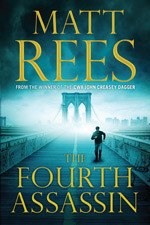 The Campaign for the American Reader blog empire's flagship is the Page 69 Test. The premise of the blog is this: open any book to page 69; if it grabs you, that's a better indication of whether you'll enjoy the book than simply reading the opening page. Try it on a book you like (and, maybe more fun, one you don't), it's pretty reliable. Blogger Marshal Zeringue asked me to submit my new Palestinian crime novel, THE FOURTH ASSASSIN, to the Page 69 Test. Here's his introduction followed by what I wrote for him about page 69 of my new book:
The Campaign for the American Reader blog empire's flagship is the Page 69 Test. The premise of the blog is this: open any book to page 69; if it grabs you, that's a better indication of whether you'll enjoy the book than simply reading the opening page. Try it on a book you like (and, maybe more fun, one you don't), it's pretty reliable. Blogger Marshal Zeringue asked me to submit my new Palestinian crime novel, THE FOURTH ASSASSIN, to the Page 69 Test. Here's his introduction followed by what I wrote for him about page 69 of my new book:Matt Beynon Rees is the author of the acclaimed series of novels featuring Palestinian detective Omar Yussef: The Collaborator of Bethlehem, which won the CWA John Creasey (New Blood) Dagger award, A Grave in Gaza, The Samaritan's Secret, and the newly released The Fourth Assassin.
He applied the Page 69 Test to the new novel and reported the following:
The first three novels in my Palestinian crime series take place in the West Bank and Gaza. All the characters are Palestinian, with the exception of a couple of foreign aid workers. But I want my series to show the full extent of Palestinian life, and half the people in the world who call themselves Palestinian don’t live in Palestine. So my hero Omar Yussef hits the road.
The Fourth Assassin, the new book in my series, takes place in the UN on the east side of Manhattan, and in the section of Bay Ridge, Brooklyn, that’s becoming known as “Little Palestine,” as immigrants from the Jerusalem area make it their home.
Page 69 hits the two main topics that make the book compelling.
First, the alienation felt by a foreigner when confronted with the enormity and chaos of New York. I wanted to show how immigrants might turn inward, rejecting the society around them, becoming religious fundamentalists. Here’s the description of a subway ride from Omar’s point of view:
"The train rumbled at low speed onto the strangely terrifying superstructure of the Manhattan Bridge. Downriver, beyond the massive girders and the mesh of electric lines, the Brooklyn Bridge arched over the water. Its famous towers sprayed thick cables along its span. Omar Yussef felt as though he were flying out of control through the air, high above the river and the tangle of highway along the shoreline. An old Vietnamese man screamed into his cell phone over the noise of the train. The wheels rang like the slow beating of a giant steel kettledrum until the train slipped back under the earth, jumped to a different track, and picked up speed. ‘This is an unnatural way of traveling,’ Omar Yussef whispered."
Second, Page 69 contains an important spark for the mystery at the heart of the book. Up to this point, no one but Omar Yussef acknowledges that things seem awry. But now his sidekick, Bethlehem Police Chief Khamis Zeydan, says to him:
"‘My brother, I have a bad feeling about this visit. Some danger that I can’t predict.’"
Now if that doesn’t hook you, nothing will. Read on to page 70, eh?
Published on February 08, 2010 11:47
•
Tags:
a-grave-in-gaza, bay-ridge, blogs, brooklyn, crime-fiction, exotic-fiction, little-palestine, marshal-zeringue, new-york, omar-yussef, the-collaborator-of-bethlehem, the-fourth-assassin, the-page-69-test, the-samaritan-s-secret, united-nations
Why's a Palestinian sleuth in Brooklyn?
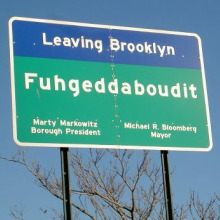 I’ve been called the Dashiell Hammett of Palestine, the John Le Carre of the Middle East, the James Ellroy of…Palestine, the Graham Greene of Jerusalem, and the Georges Simenon of the Palestinian refugee camps. Depends which review you happen to have read.
I’ve been called the Dashiell Hammett of Palestine, the John Le Carre of the Middle East, the James Ellroy of…Palestine, the Graham Greene of Jerusalem, and the Georges Simenon of the Palestinian refugee camps. Depends which review you happen to have read.Until now I’ve published three novels about Omar Yussef, my Palestinian schoolteacher/sleuth. Omar has been described as the Philip Marlowe of the Arab street, the Hercules Poirot of the Near East, Sam Spade fed on hummus, and Miss Marple crossed with Yasser Arafat.
Why then is my new Omar Yussef novel THE FOURTH ASSASSIN,/a> set in New York City? Not in the Middle East, the Near East, Palestine, the Levant, the Fertile Crescent, or any other place where Yasser may be fornicating with dear old Miss Jane Marple.
I lived in New York six years, until I came to Jerusalem in 1996. I know it better than any city outside the Middle East. I had a lot of fun in New York. Maybe too much fun. In no other place in the world can a young man so overindulge in the temptations originally offered in the city of Sodom. Which in reality is close to where I live now in Jerusalem. Though you wouldn’t know it to look at the place.
I know New York with my eyes closed. Literally. In my twenties, after leaving some bar or club, I blacked out on every line on the subway map.
I dated women from every borough of the city, from Westchester and upstate. From the 201 area code (dare I say, New Jersey.)
I married a girl from the North Shore of Long Island, and in my continuing effort to know New York in all its facets, when we divorced, I married a beautiful woman from the South Shore of Long Island.
But each time I returned, no matter how well I thought I knew the place, New York seemed different. The change became most apparent after 9/11. I wanted to understand it through the eyes of Omar Yussef.
That’s why he finds himself in Brooklyn in THE FOURTH ASSASSIN. Visiting the area of Bay Ridge that has become known as “Little Palestine,” for the influx of Palestinian immigrants.
Little Palestine isn’t a community of Palestinian intellectual émigrés, such as sprang up in European capitals in the 1970s. It’s a new wave of young men mostly, saving to bring their families over, working two or more jobs. Theirs is a typical American immigrant story.
Except for the FBI agents going through their trash.
The Bureau didn’t uncover any broad conspiracy in Little Palestine. But it did add to the tensions between the Arab community and other New Yorkers after the attack on the Twin Towers.
That’s the situation into which I wanted to place Omar Yussef. Mutual distrust, after all, makes for good crime fiction.
In Brooklyn, it also happens to be real.
Published on February 11, 2010 23:51
•
Tags:
bay-ridge, brooklyn, crime-fiction, dashiell-hammett, fbi, fertile-crescent, georges-simenon, graham-greene, hercules-poirot, james-ellroy, jerusalem, levant, little-palestine, long-island, middle-east, miss-jane-marple, miss-marple, near-east, new-jersey, new-york, omar-yussef, palestine, palestinians, philip-marlowe, sam-spade, the-fourth-assassin, upstate-new-york, westchester-county, yasser-arafat
The Daily Beast and The New York Times
 My new Palestinian crime novel THE FOURTH ASSASSIN is one of five "This Week's Hot Reads" on The Daily Beast, which is also the hot read of the web these days. The Beast says of my book and its Brooklyn setting: "Rees paints a meticulous portrait of the post-9/11 community of Little Palestine and the tension of cultures trying to co-exist."
My new Palestinian crime novel THE FOURTH ASSASSIN is one of five "This Week's Hot Reads" on The Daily Beast, which is also the hot read of the web these days. The Beast says of my book and its Brooklyn setting: "Rees paints a meticulous portrait of the post-9/11 community of Little Palestine and the tension of cultures trying to co-exist."Meanwhile, The New York Times Book Review highlights the paperback release of my previous novel THE SAMARITAN'S SECRET in its Paperback Row column, calling the book "provocative and humane." Seems The Times'd rather print a nice photo of me than one of Jimmy Carter, too. Well, the old boy had his time in the sun.
Published on February 13, 2010 23:31
•
Tags:
9-11, bay-ridge, brooklyn, crime-fiction, jimmy-carter, little-palestine, matt-beynon-rees, new-york, new-york-times-book-review, paperback-row, the-daily-beast, the-fourth-assassin, the-samaritan-s-secret
New York Times Book Review: THE FOURTH ASSASSIN 'engrossing,' 'New Yorkers will be startled'
"New Yorkers are bound to be startled by the views of their city advanced by Matt Beynon Rees in THE FOURTH ASSASSIN (Soho). In his new mystery featuring Omar Yussef, a Palestinian who teaches history at a school for girls in Bethlehem, Rees, a former Jerusalem bureau chief for Time magazine, brings his series’s hero to New York for a conference at the United Nations. But first, Yussef visits “Little Palestine,” in the Bay Ridge section of Brooklyn, where his youngest son lives — and stumbles onto the headless corpse of one of his son’s roommates. Over the course of an engrossing investigation conducted by a Palestinian-born New York detective, Yussef is educated in the harsh views of Arabs in some quarters of the city and exposed to the simmering anger of young Arabs like his son. Even more distressing, he sees how his Middle Eastern brethren have brought to America the same animosities that made them bad neighbors back home."
Published on February 26, 2010 22:59
•
Tags:
arab, bay-ridge, brooklyn, crime-fiction, detective-fiction, little-palestine, marilyn-stasio, middle-east, new-york, new-york-times-book-review, omar-yussef, palestine, palestinians, reviews, the-fourth-assassin, the-new-york-times, time-magazine, united-nations
How does that grab you? Great openings to new books
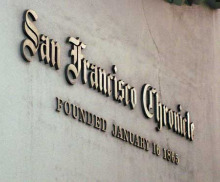 The first line of a great novel tends also to have a lot of punch -- to "grab" you. My all-time favorite is "The Sun Also Rises," which manages to tell you a great deal about one of the main characters, but even more about the narrator: "Robert Cohn was once middleweight boxing champion of Princeton. Do not think that I am very much impressed by that as a boxing title, but it meant a lot to Cohn." This weekend The San Francisco Chronicle has a feature called "Grabbers--first sentences from new books," in which the 'paper highlights good openings to some recent books by Katharine Beutner and Malcolm Nance, among others. The 'paper was good enough to include among those they commend the first lines of THE FOURTH ASSASSIN, my new Palestinian crime novel: "As he left the R train and came up the narrow, gum-blackened steps from the Fourth Avenue subway in Brooklyn, Omar Yussef glanced around for armed robbers and smiled." Do you have a favorite opening from current fiction or nonfiction?
The first line of a great novel tends also to have a lot of punch -- to "grab" you. My all-time favorite is "The Sun Also Rises," which manages to tell you a great deal about one of the main characters, but even more about the narrator: "Robert Cohn was once middleweight boxing champion of Princeton. Do not think that I am very much impressed by that as a boxing title, but it meant a lot to Cohn." This weekend The San Francisco Chronicle has a feature called "Grabbers--first sentences from new books," in which the 'paper highlights good openings to some recent books by Katharine Beutner and Malcolm Nance, among others. The 'paper was good enough to include among those they commend the first lines of THE FOURTH ASSASSIN, my new Palestinian crime novel: "As he left the R train and came up the narrow, gum-blackened steps from the Fourth Avenue subway in Brooklyn, Omar Yussef glanced around for armed robbers and smiled." Do you have a favorite opening from current fiction or nonfiction?
Published on February 28, 2010 01:29
•
Tags:
alcestis, american-fiction, bay-ridge, brooklyn, crime-fiction, ernest-hemingway, general-fiction, katharine-beutner, little-palestine, malcolm-nance, new-york, newspapers, novel-openings, omar-yussef, opening-lines, palestine, palestinians, robert-cohn, san-francisco, san-francisco-chronicle, the-fourth-assassin, the-sun-also-rises
Gumshoe Review: THE FOURTH ASSASSIN 'excellent'...and a list of crime fiction good, bad and pointless
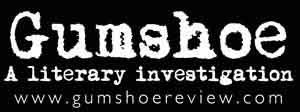 Top crime fiction blog Gumshoe Review rates my new Palestinian crime novel THE FOURTH ASSASSIN very highly: "Rees does an excellent job of showing the pressures on the young Palestinians and describing the microcosm of one immigrant community within the U.S. The mystery also contains plenty of twist and turns." Read Mel Jacobs's full review.
Top crime fiction blog Gumshoe Review rates my new Palestinian crime novel THE FOURTH ASSASSIN very highly: "Rees does an excellent job of showing the pressures on the young Palestinians and describing the microcosm of one immigrant community within the U.S. The mystery also contains plenty of twist and turns." Read Mel Jacobs's full review.If you feel compelled to read any other crime fiction but mine -- or if you've already read all my books -- I'd direct you to a list of the 100 Best Crime Books on the Court Reporter blog. Many of the selections are hardly surprising -- you're not likely to say to yourself, "Oh, The Maltese Falcon, how'd they come up with that?" Well, if you DO say that, then you've probably got 100 new books for your nightstand, because surely you can't have read any crime fiction BEFORE you read The Maltese Falcon. That's just unacceptable! Anyway, much of the rest of the list comprises overrated twaddle (dragon tattoos, for example) which has somehow become accepted as a staple of the genre (several genres in fact, because the list includes true crime, thrillers and slasher stuff), classics which to those who bother to read them these days will be head-scratchingly dull, and many others which are fiendishly outdated to the modern reader (yes, Sherlock Holmes fans, I'm talking to you). But you may find something you didn't know about, so take a look.
Published on March 02, 2010 02:21
•
Tags:
bay-ridge, blogs, brooklyn, court-reporter, crime-fiction, dashiell-hammett, gumshoe-review, lists, little-palestine, mel-jacobs, new-york, palestine, palestinian, reviews, sherlock-holmes, stieg-larsson, the-fourth-assassin, the-girl-with-the-dragon-tattoo, the-maltese-falcon, united-nations
Literary reviews: If you can’t say something nice…
That’s not because of any insecurity about my writing. If a review is bad, I know the reviewer got it wrong. It’s the mere existence of negative thoughts about me and my work floating around out there, even if it’s only an aside in an otherwise positive review – that’s what makes my lunchtime hummus taste like cement.
It’s a feeling highlighted by the gratitude of a good review and the sheer love felt for the writer of a really glowing review. Right now, for example, I’m quite in love with Joe Hartlaub, reviewer for Bookreporter.com. A couple of days ago, Joe published a review of THE FOURTH ASSASSIN, my latest Palestinian crime novel. He wrote:
“Matt Beynon Rees, a Welsh journalist living in Jerusalem, writes a series known as the Omar Yussef Mysteries. If you pick up anything at all that is bound between two covers, you should be buying and reading them even if you hate mysteries. If you happen to like mysteries, please read THE FOURTH ASSASSIN, the latest Yussef novel, and recommend it to an unenlightened friend.”
You’re very kind, good sir. But wait, Joe goes on:
“Take a look at the first four pages or so. The book begins with Yussef, newly arrived in the United States, climbing the stairs of the Fourth Avenue subway exit in Brooklyn in the heart of Little Palestine. Much is familiar, and much is different. I may have read better written passages recently, but I don’t think I have read any that I have loved as much as the ones contained in these opening pages. This is classic work that will stand up 20 or 30 years from now when you (maybe) and I (almost certainly) are gone, and the problems that currently exist will still remain. Brilliantly conceived and beautifully written, THE FOURTH ASSASSIN is strongly recommended.”
Thirty years? Joe, may you live to 120.
My delight in this review isn’t the same as kick my two-year-old gets when I tell him he’s the most handsome boy in the world. No, it’s rather that someone has chosen to do exactly what I try so hard to do day by day – to be positive.
And being positive about a book seems strangely hard for people to do.
Many reviews, positive ones in particular, measure out the encouraging phrases as if they were sugar to a diabetic.
Truly negative reviews, of which I’ve only really had one, seem entirely a reflection of an almost psychopathic need to be both right and a little cruel at the same time. (That’s why Alain de Botton famously fumed when he received such a review for his book a year ago. Someone was being a smartass at his expense, and in a forum where he felt he had no comeback. Like being sassed by a cool kid at school when you’re unable to talk back.) There’s also a degree of showing off in a negative review which always makes them deeply suspect, in my opinion – was this a bad book, or simply something about which our reviewer needs to show himself to be the most knowledgeable fellow in the world?
Few writers these days claim to never read reviews. But it’s a dangerous pastime, particularly with the plethora of blogs and even reader reviews on amazon.com. Reviews on amazon are mostly conscientious, but every book seems to have at least one review on that site which begins “I couldn’t get past the first chapter, don’t know why, maybe it was just me, but I gave the whole book only one star anyway.”
A couple of years ago I decided never to write a negative review. I was sure that in a karmic way it’d come back to haunt me. I expressed this view to a literary editor who had sent me a true stinker for review. He twisted my arm; I wrote the review; something mildly unpleasant happened soon after. I know why. It won’t happen again.
Published on March 07, 2010 07:16
•
Tags:
alain-de-botton, amazon-com, blogs, bookreporter-com, brooklyn, crime-fiction, jerusalem, joe-hartlaub, kingsley-amis, literary-reviews, little-palestine, matt-beynon-rees, mysteries, mystery-fiction, omar-yussef, reviews, the-fourth-assassin, united-states, wales
Long gestation and the crime novel
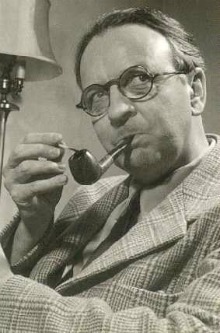 Crime novelists generally write a novel a year. It’s what publishers want. Some big writers—and I mean, 25 million books sold—have told me their publishers and agents complain that if they don’t produce a book a year their readers will forget them.
Crime novelists generally write a novel a year. It’s what publishers want. Some big writers—and I mean, 25 million books sold—have told me their publishers and agents complain that if they don’t produce a book a year their readers will forget them.In the case of such writers, some of those 25 million may have degenerative diseases and others may be plain stupid, but in all likelihood about 24 million of them will remember a writer whose book they read, let’s say, two years ago.
Nonetheless the expectation remains that a book a year will be forthcoming. So do all crime writers have one good idea a year? Or do ideas take longer to gestate? And if they do, where does that leave the writer who needs to get words on paper right now.
In the case of my latest novel MOZART’S LAST ARIA (out now in the UK, but not until November in the US), it was eight years between the initial idea and publication. A most un-crime-fiction-like timescale.
It began with a trip I took with my wife into the Salzkammergut, to find peace among the mountains and lakes at a time when we were living through the Palestinian intifada in Jerusalem. There we stumbled across the remote house where Mozart’s sister Nannerl had lived and a fascination with her was born.
It was nurtured through future visits to Vienna, to Prague (where Mozart’s operas are still performed in the Estates Theater, scene of his “Don Giovanni” premier), dinners with Maestro Zubin Mehta at which we discussed our mutual admiration for the great composer (though it shan’t surprise you to learn that his understanding of the music is on a somewhat, ahem, more elevated level than mine…)
Read the rest of this post on my blog The Man of Twists and Turns.
Published on May 18, 2011 23:55
•
Tags:
austria, brooklyn, crime-fiction, detective-fiction, evan-fallenberg, intifada, jerusalem, little-palestine, mozart-s-last-aria, nannerl-mozart, palestine, piano, prague, research, salzkammergut, vienna, wolfgang-amadeus-mozart, wolfgang-mozart, writers, zubin-mehta



